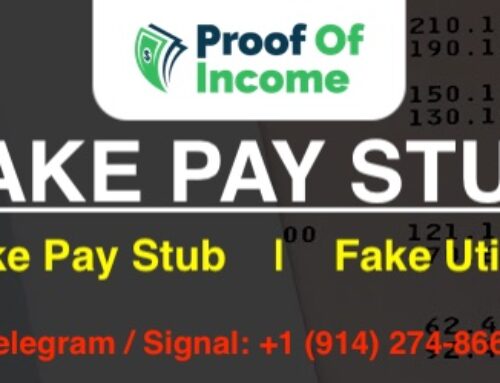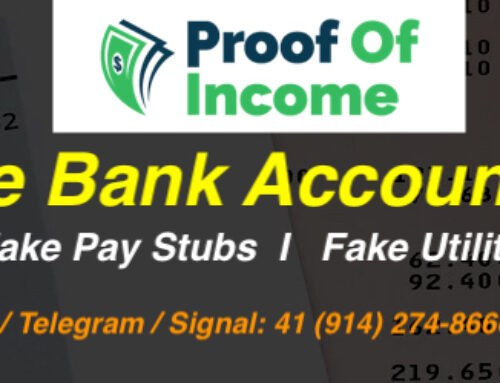How Does The IRS Know If You Have Rental Income?
Introduction
Are you earning money from renting out a property? If so, it’s important to understand how the IRS handles rental income. In this guide, we’ll break down everything you need to know in plain, easy-to-understand language. So, learn how to edit bank statement.
When it comes to fake bank statements for loans or using fake utility bills as proof of address, it’s important to be cautious. People might seek out templates or bank statement generator software to create fake or novelty documents or even try to edit bank statements online. However, such actions can lead to legal trouble and damage your financial reputation.
If you suspect someone has given you a fake Chase bank statement or any replacement or novelty document, keep an eye out for inconsistencies, unusual formatting, or misspelled words. Seek professional help if needed, but remember that it’s best to maintain financial honesty and avoid the risks linked with fake documents. There are lawful ways to address financial needs or prove your address without resorting to fraudulent actions.
FAQ
Q1: Do I need to report rental income to the IRS?
A1: Yes, you do. It’s a must. When you make money from renting out your property, you need to report it to the IRS.
Q2: How do I report rental income to the IRS?
A2: You usually report it on your federal income tax return using Schedule E of Form 1040.
Q3: What if I receive a Form 1099 from a property management company?
A3: You still need to report your rental income, even if you receive a Form 1099. The IRS wants to make sure they have all the information.
Q4: Can the IRS check my bank records for rental income?
A4: Yes, they can. If you have unreported rental income, the IRS might spot it by checking your bank records.
Q5: What happens if I don’t report my rental income accurately?
A5: If you’re not truthful about your rental income, you could face penalties, interest, and even legal trouble.
Now, let’s dive into the details.
What is Rental Income?
Rental income is the money you make from renting out your property. It can come from various sources, such as:
- Rent payments from tenants
- Security deposits (if you don’t return them)
- Advance rent payments
- Any services you provide to tenants (like cleaning or parking fees)
When you earn any of this income, it needs to be reported to the IRS.
Reporting Rental Income
Reporting your rental income to the IRS is a requirement, and it’s relatively straightforward. Here’s how you do it:
- Use Schedule E: If you’re using Form 1040 to file your taxes, make sure to complete Schedule E. This is where you report your rental income and expenses. Keep it simple and don’t leave anything out.
- Document All Income: You should keep accurate records of all the rental income you receive. This includes rent payments, security deposits, and any additional income sources related to your rental property. So, Under the guidance of experts you can learn how to edit bank statement.
- Don’t Forget Expenses: The good news is that you can also deduct certain expenses related to your rental property. This can help reduce your taxable income.
- Report Any Form 1099s: If you receive a Form 1099 from a property management company or another entity related to your rental income, make sure to report this as well.
The IRS and Rental Income
The IRS is vigilant about rental income because it wants to ensure that everyone is paying their fair share of taxes. Here are some ways they keep tabs on rental income:
- Data Matching: The IRS uses computer systems to cross-check information. They match details from tax returns, 1099 forms, and other financial records to spot discrepancies or unreported income.
- Random Audits: Sometimes, the IRS conducts random audits. If you’re chosen for an audit, they will closely examine your tax return, and any unreported rental income will come to light.
- Whistleblowers: If someone suspects tax evasion or non-compliance, they can tip off the IRS. This includes reporting unreported rental income. The IRS takes such tips seriously.
Common Pitfalls to Avoid
Now, let’s discuss some common pitfalls you should steer clear of when dealing with rental income and taxes:
- Ignoring Rental Income: The biggest mistake is failing to report your rental income. Ignoring it can lead to significant problems down the road.
- Misreporting Income: Be truthful about the amount of rental income you receive. Fudging the numbers can result in penalties and interest.
- Overlooking Deductions: Don’t forget to deduct allowable expenses. This can save you money on your tax bill.
Reporting Rental Income FAQs
Q6: What if I rent out a part of my own home?
A6: So, if you rent out a part of your own home, like a room or a basement, you still need to report the rental income. However, you may be able to deduct a portion of your expenses.
Q7: Can I deduct maintenance and repair costs?
A7: Yes, you can typically deduct expenses related to maintaining and repairing your rental property. Just keep detailed records.
Q8: What happens if I make a loss on my rental property?
A8: So, if your rental expenses exceed your rental income, you might have a rental loss. This can sometimes offset other income on your tax return.
Q9: Do state and local governments also want to know about my rental income?
A9: Yes, they often require you to register your rental property and report rental income. The IRS may also access this information.
Q10: What if I have multiple rental properties?
A10: And, if you have more than one rental property, you’ll need to report the income and expenses for each property separately. It’s a bit more work, but it’s necessary.
Q11: Can I use tax software to help with reporting rental income?
A11: Yes, there is tax software available that can guide you through reporting rental income. It can be a helpful tool to ensure accuracy.
Q12: What records should I keep for my rental property?
A12: And, you should keep records of all income and expenses related to your rental property. So, this includes rent receipts, invoices, repair bills, and more.
Wrapping Up
In conclusion, reporting rental income to the IRS is a crucial responsibility for anyone earning money from rental properties.
So, the IRS uses various methods to ensure compliance, including data matching, audits, and tips from whistleblowers.
And, to avoid pitfalls and penalties, it’s essential to report your rental income honestly and accurately.
So, keep records of your income and expenses, and don’t forget to take advantage of deductions.
Moreover, if you have multiple rental properties, remember to report them separately. Tax software can also be a helpful tool in this process. So, learn how to edit bank statement.
Furthermore, by following these guidelines, you can stay on the right side of the IRS and ensure a smooth tax filing experience.
So, we hope this guide has been helpful in demystifying the world of rental income and taxes. And, if you have any further questions or need personalized advice, it’s a good idea to consult with a tax professional who can provide expert guidance.





